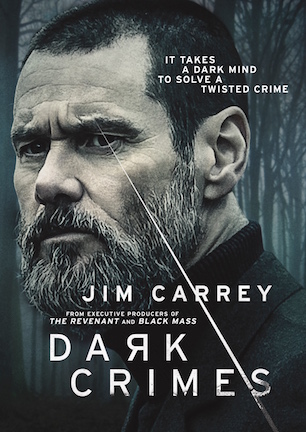Studio: Lionsgate
Director: Alexandros Avranas
Writer: Jeremy Brock
Producer: Jeffrey Soros, Simon Horsman, Brett Ratner, David Gerson, John Cheng
Stars: Jim Carrey, Marton Csokas, Charlotte Gainsbourg, Kati Outinen, Vlad Ivanov, Robert Wieckiewicz, Agata Kulesza, Piotr Glowacki
Review Score:
Summary:
A disgraced detective connects the murder of a businessman in an underground sex club to an author’s unpublished novel.
Review:
Of all the balls dropped by “Dark Crimes,” none land with a more deafening thud than the baffling choice to have an anesthetized Jim Carrey sleepwalk as a colorless Polish policeman. Almost entirely devoid of visible personality, his role could have been played by a non-name actor without any appreciable alteration to the end product. Of course, the irony is you never would have heard of the movie if Jim Carrey wasn’t involved, because there is nothing else noteworthy about it.
Tadek is a typical disgraced detective. He has no friends on the force. His neglected wife harbors resentful concerns that work consumes him. And a clash with a rival-turned-superior has reduced him to desk duty unceremoniously organizing files.
Tadek instinctually remains “natural po-lice,” as Bunk Moreland would put it. Digging into a cold case, Tadek connects the unsolved murder of a man in an underground S&M club to alarmingly accurate details recounted in a novel by an arrogant author. Tadek believes he has stumbled upon a confession in fiction form. To bring his suspect off the page and into custody, Tadek must untangle a dusty cobweb of corrupt cops and deceitful sex workers without sinking deeper into the morass infecting his troubled mind.
Prior to “Dark Crimes,” I wouldn’t have imagined it possible that a salacious murder mystery involving a wily writer and a clandestine sex dungeon where businessmen pay to role-play bondage fantasies could be so tediously dry. With Jeremy Brock’s standardized script rolling through rote motions while wearing a blindfold, director Alexandros Avranas turns an enthralling true story into a tepidly tame drama overloaded on inconsequential conversation and sleep-inducing inactivity.
It might be considered criminally inaccurate to even classify “Dark Crimes” as a thriller. It’s a purely pedestrian police procedural founded on an absence of both action and ambition.
The film’s first twenty minutes predominantly consist of Tadek pensively reviewing old tapes. Tadek then starts a cycle of questioning people interested only in speaking cryptically or not at all, forcing another establishing shot interlude so the glum gumshoe can rinse and repeat for another stubbornly useless interpersonal exchange. Taking the option of a whodunit off the table immediately, Tadek fingers his suspect right away, making his case a dull dot connect to prove this person’s guilt rather than conduct a twisty investigation that would translate to traditional crime caper intrigue.
The closest any scene comes to providing visceral suspense is Tadek having to hide when he breaks into a house whose occupants come home unexpectedly. There’s also a brief moment where a car races toward Tadek at a medium pace, though that threat comes off as equally insincere.
Facing few physical dangers that might entice an audience toward engagement, Tadek occupies idle time with routine family man troubles instead. Concerned he is too intimately involved in the case, Tadek’s wife Marta predictably threatens to leave him and take their daughter with her. “Dark Crimes” cares so little for these characters, the camera frames a family dinner with Marta fully blocking the daughter’s head, as if to highlight how unimportantly faceless such a person is.
This characteristic stays consistent across the cast. Secondary players appear infrequently and without accompanying context, rendering them instantly forgettable and quickly forgotten. The film grants Carrey just one measly moment to flash dramatic chops with a third act emotional breakdown. Yet it comes at discovering the death of someone who appeared in only a singularly brief scene, leaving the audience incapable of having an empathetic reaction.
“Dark Crimes” illustrates what it looks like when a star knows he picked a poor project, but is contractually obligated to expend minimal effort anyway, just like the rest of the movie does. Saddled solely with matter-of-fact dialogue meant to move the clock forward, Carrey’s unfairly assigned boredom projects a mental message of, “let’s get this over with” behind every brusque bit of exposition. It’s a sentiment certain to be shared by anyone unfortunate enough to endure “Dark Crimes” through to its laughably limp conclusion.
Review Score: 20






In hindsight, maybe the more muted “28 Years Later” had to walk so the more meaningful “The Bone Temple” could run.